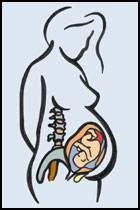While every practitioner is different, the basics of the prenatal visit are usually the same. Some of these will be done in different orders, some at every visit, while others not at every visit. You may even have things done that are not on this list. The thing to remember is always ask what the test is for, how are the results given, do you have an option for a different test, to skip the test, or wait for awhile.
Here is what will happen at a typical prenatal appointment with your midwife or doctor:
- Give urine. This is done to check for many different things, usually protein and glucose. These may indicate a problem, or just give us history about what you had for breakfast!
- Blood Pressure. Having this taken at every visit will give us a baseline. This will tell us what your normal blood pressure should be, and if it rises, what the rate of rise was. It is not absolute numbers as much as it is rate of rise when looking at blood pressure as a problem.
- Fundal Height. This measures the size of your uterus. It is usually begun around 20 weeks. At this point the uterus usually measures 20 centimeters from the pubic bone, and will stay around the number of weeks you are. The numbers will be give or take about 2, and can change as the baby changes position and grows. They might indicate a problem or surprises (twins!) if the numbers change dramatically.
- Fetal Heart Rate. If your practitioner uses a doppler this miraculous sound can be heard on average about 12 weeks. Maternal fat stores, positioning of the uterus might get in the way. Around 18 weeks a fetoscope or regular stethoscope will pick up the baby's glorious beats. (Hear a baby.)
- Nutrition. What have you been eating? How are you feeling? Weight fluctuations... You might need some help in directing your diet.
- Health. Are you tired? How is work? Do you have any swelling? Headaches, sinus problems, etc.
- Mental Health. How are you adjusting to the pregnancy? How is your family reacting? Are you preparing for baby?
- Social Behavior. Are you smoking, drinking, taking drugs? Are you around people who smoke?
- Questions? What questions do you have about future visits, things that have come up, the future?








